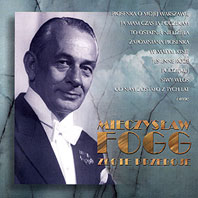Prominent Poles
Mieczyslaw Fogg (born as Mieczyslaw Fogiel), singer, actor.

Born: May 30, 1901, Warsaw, Poland
Died: September 3, 1990, Warsaw, Poland
Early days. His father was a locomotive engineer and his mother owned a grocery store.
He spent his childhood in Warsaw and participated in the 1920 war against the Bolsheviks. After graduating from a local gymnasium in 1922, he started working as a railway cashier (until 1935).
Career. About that time he also joined the choir of the St. Anne's Church. There his friend, Ludwik Sempolinski, made him join the classes of music run by Professor Lysakowski. He continued his musical education under the guidance of notable musicians: Mossakowski, Brzezinski, Dygas, Belina-Skupiewski, Didur and Kopf. Initially a hobbyist, in 1928 Fogiel met Wladyslaw Danilowski Dan, who chose him as a soloist for his newly formed Dan's Choir (called then Coro Argentino V). The choir became extremely popular the following year when Jerzy Petersburski's song Tango Milonga became an international hit. This and other tangos and romances performed by the choir in the famous Qui pro Quo theatre led Fogiel to become one of the most popular Polish singers. Afterwards he was connected to the theaters Banda, Rex, Polonia, Cyrulik Warszawski, Wielka Rewia, Małe Qui Pro Quo and Tip Top After 1932 Fogiel, under a pseudonym of Fogg, toured a number of countries, including Germany, Latvia, USSR, Finland, Norway, Sweden, Austria and Italy. In the United States the group toured 31 states. His popularity was increased by the fact that Fogg was keen on languages and was able to sing in local languages of the countries he toured. He also appeared in a number of duos with other popular artists of the time, including Hanka Ordonówna, Stefcia Górska, Zula Pogorzelska and Adolf Dymsza. He also appeared in 11 films. After the Dan’s Choir was disbanded in 1938 Fogg started a solo career. The same year he was chosen as the most popular Polish singer by the Polish Radio. He toured the country with a trio composed of himself, Mira Zimińska and Tadeusz Sygietyński. Among the authors of his songs was also Marian Hemar. After the outbreak of World War II Fogg remained in Warsaw, where he joined the underground Armia Krajowa. He gave concerts (with the consent of Polish underground authorities) in the few cafes available to Poles under German occupation (among others Cafe Bodo, Swann, U Aktorek and Lucyna). During the Warsaw Uprising he gave countless concerts both on the barricades, in hospitals and in the bomb shelters beneath the city. He was also a soldier and a member of I Batalion Szturmowy Odwet. For his efforts to keep high the morale of the soldiers and civilians of the fighting city he was awarded with some of the highest Polish decorations. Mieczysław Fogg was one of the Polish Righteous among the Nations: he hid a Jewish family in his apartment till the end of World War II. After the war, in 1945 he opened up his own café, Café Fogg, in the ruins of Warsaw. The cafe was the first music theater opened after the war in the destroyed city and served as one of the very few centers of culture. However, the following year it was nationalized by the new communist authorities of Poland and closed soon afterwards. Fogg continued to give hundreds of concerts in all parts of Poland and also headed his private music record firm Fogg Records, which shared the fate of Fogg's cafe in 1951. He continued to give concerts almost until his death in 1990. Throughout his 60-years long career he gave more than 16,000 of them in all countries of Europe, Brasil, Israel, Ceylon, New Zealand, Australia, Canada and the US. His everlasting popularity led to the creation of a number of anecdotes. Mieczyslaw Fogg is buried at the Bródno Cemetery in Warsaw.
Awards and prizes. 1938 and 1958 chosen the most popular Polish singer by the audience of the Polish Radio; Cross of Merit with Swords for participation in 1944 Warsaw Uprising;1952 Gold Cross of Merit; 1970 an honorary Golden Disk from Polskie Nagrania; 1972 a title of the most popular Polish singer issued by the city of Chicago;1976 a diploma of Poland’s Minister of Foreign Affairs; 1986 Commander’s Cross with Star of the order of Polonia Restituta; 1977 Homo Varsoviensis award; awarded a name Spiewajacy Bialy Orzel (A Singing White Eagle) by a chief of Tuscarora Indian tribe; Righteous among the Nations award with a tree in Yad Vashem (Israel): The artist was very helpful to his Jewish colleagues: he extricated from the ghetto Ignacy Singer, the conductor of the "Qui Pro Quo" theater orchestra, his wife Lola and daughter and hid them in his apartment till the end of the German occupation. He helped also Stanislaw Kopf, an engineer, Stanislaw Tempel, Ignacy Zalesztajn, and the son of Dr. Henryk Gliksberg who escaped from a train to the Treblinka camp. All of Fogg’s actions carried a death penalty if caught by the Nazis.
Personal. His only son, Andrzej Fogg, an electroacoustical engineer, was an inventor and an author of a monograph Gramofony.
Some of his songs. Tango Milonga, To ostatnia niedziela, Jesienne róze, Pierwszy siwy wlos, Maly bialy domek, Juz nigdy, Bei Mir Bist Du Schön
Films. Fogg appeared in 11 Polish films: Parada Warszawy; Panienka z poste restante; Dziesieciu z Pawiaka ; Palac na kólkach; Straszna noc; Rok 1914; Dzieje grzechu; Ulani, ulani, chlopcy malowani; Niebezpieczny romans; Wacus; Dodek na froncie.
Main source:
Text is available under the Creative Commons Attribution-ShareAlike License; additional terms may apply.:
Wikipedia
Supplemented with information included in:
Wikipedia in Polish
A list of Polish Righteous
Fogg singing "Tango Milonga"
Fogg singing "To ostatnia niedziela"
Fogg singing "Maly bialy domek"
Fogg singing "Bei mi bist Du..."
Fogg singing "Caluje Twoja dlon..."
Return to home page:
Prominent Poles
